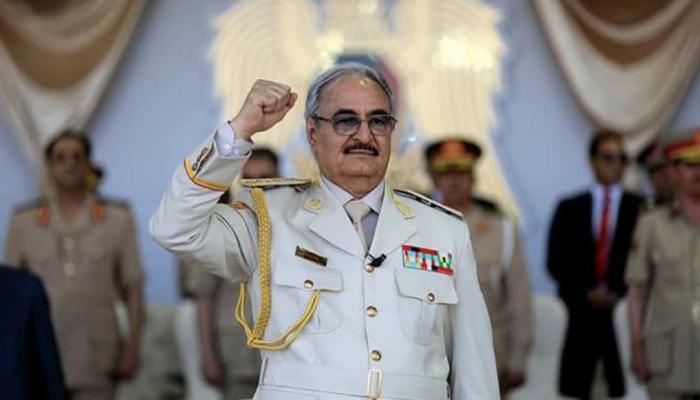UAE-backed retired general Khalifa Haftar has been pushing to sabotage and destroy Libya in horrific massacres of civilians in an attempt to make up for his failure to enter the Libyan capital Tripoli, the headquarters of the internationally recognized Government of National Accord.
Facts on the ground show that Haftar chose the destructive escalation in his battle for control of Tripoli.
Nearly five months after the start of the assault on the Libyan capital, Haftar failed to achieve the quick breakthrough he had hoped to control the capital, which is damaging his image with his supporters and prompt him to act more aggressively.
Haftar has had little success in his counterattack following the loss of the strategic city of Gharyan, and he suffers from a shortage of men and resources. Accordingly, he overshadows his shortcomings on the ground by intensifying devastating air attacks not only on Tripoli but also on Misrata southwest of the country.
It seems that Haftar’s current impasse over Tripoli may have implications for his situation eastern region, where signs of restlessness and even dissent are beginning to emerge due to corruption in his camp and the iron hand that runs the area.
Observers agree that Haftar has so far managed to maintain his position thanks to the support of the UAE regime with money and weapons, but in the absence of military victories, his image as a strong man is about to distort.
Recently, anger against Haftar in Benghazi has been rising among the Awajir and neighboring tribes of Ajdabiya and the Tabu and Tuareg tribes have been observed in recent months.
Since the start of the Haftar attack on the capital, Tripoli, the international community has merely condemned the “Libyan parties” and called for a “cessation of hostilities and escalation” without directly condemning Haftar.
Haftar’s air strikes on civilian neighborhoods and installations continued to be undeniable. In mid-April, at least eight civilians were killed and more than 24 injured in aerial bombardment of Abu Salim.
Libyan media sources also pointed out that Amitiga airport, the only civilian airport, has been targeted by Haftar Airlines more than 15 times since Haftar’a aggression last April, despite repeated international condemnation and demands to stop targeting the airport.
In early July, the Government of National Accord (GNA) accused Haftar’s forces of carrying out an airstrike on the headquarters of illegal immigrants in the Tajoura area, east of Tripoli, which killed nearly 60 migrants and tens others were injured.
On the 5th of this month, Haftar aircrafts targeted Al-Qalaa neighborhood in the southern city of Mazraq, killing 42 civilians and wounding 51 others, according to a UN mission statement, which only condemned the targeting of civilians without condemning Haftar’s forces, which officially announced their responsibility for the bombing in Al-Masmari’s press conference on the same day.
Haftar’s raids have even affected health-care facilities, as the mission has confirmed it identified 37 attacks on health facilities and personnel since the beginning of Haftar’s operation in the capital Tripoli.
The mission, which also did not mention Haftar’s involvement in the attacks despite its characterization as a “war crime,” confirmed that it had damaged at least 19 ambulances and 19 hospitals, killing a total of 11 people and injuring more than 33 others. However, the numbers are expected to be much higher.
The World Health Organization said that in the beginning of this month, at least 106 civilians died added to 1,048 other as the total of the death toll of Haftar’s war on the capital Tripoli, in addition to more than 5,000 wounded.
Faced with ongoing massacres, observers believe that if the international community and Western governments offer another option in which the people of the Eastern Province are included in a just way, then an orderly transition can take place. If such a development does not take place, a rival for Haftar will eventually emerge, and fratricidal battles that could plunge the East into chaos, which the UAE conspires against.
The UAE is also pushing Libya into a box of chaos by creating the environment for radical fundamentalist groups to take advantage of these volatile situations to move again.
Before Haftar began his operation on Tripoli in April, there was an ISIS attack every six months. Since then, seven or eight attacks have been recorded.
The danger of Isis expanding its sphere of influence through the use of chaos as cover remains high. This will not only pose a threat to Libya but also to the whole region.




